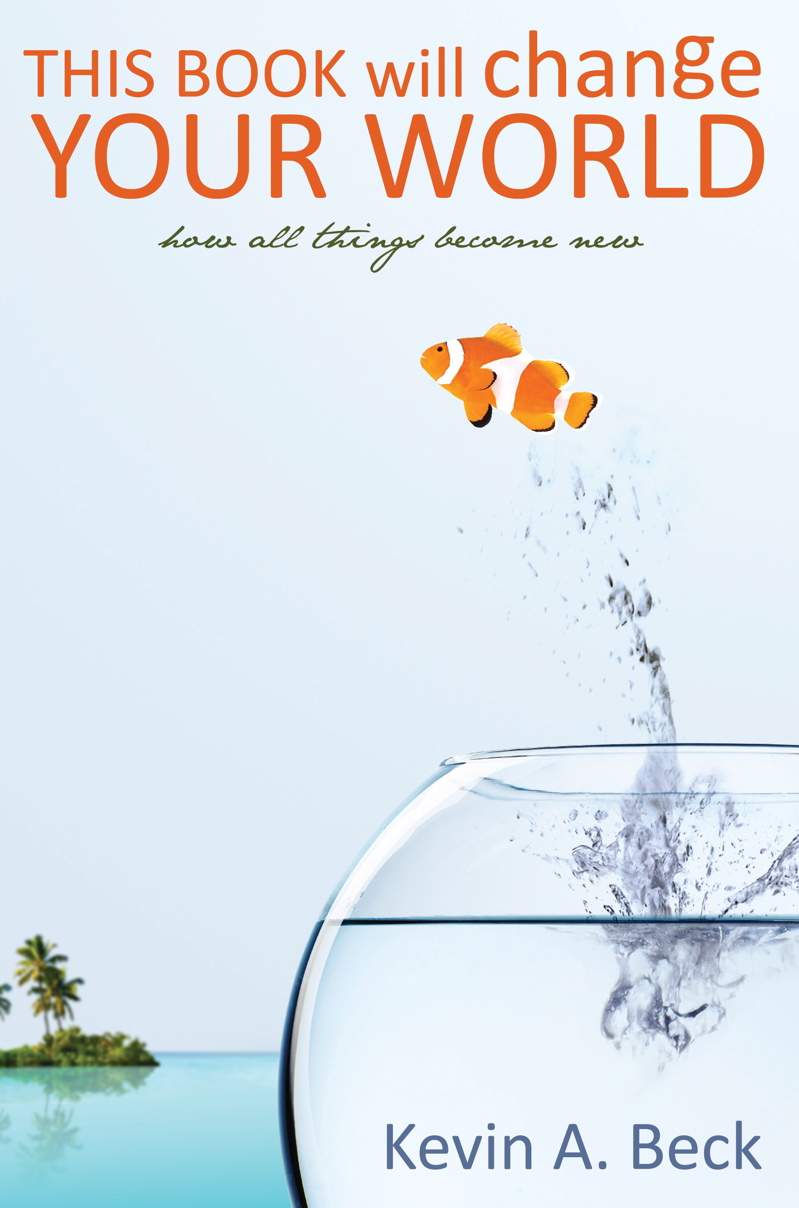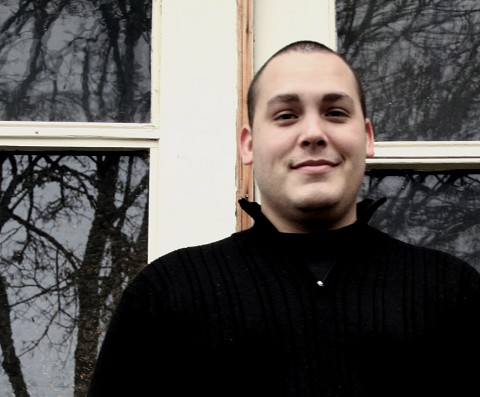By Jesse Medina
Wrecked was able to interview Kevin Beck, author of This Book Will Change Your World to probe his mind about the theory behind the book. If you haven’t already, be sure to check out the book review.
About the Author: Kevin Beck is COO of Presence International. He enjoys living under the blue skies of Colorado Springs with his wife Alisa and their three electrifying children. You can find him online at www.presence.tv and www.transmillennial.blogspot.com.
Wrecked: What was your motivation for writing this book?
Beck: What I’m interested in is helping people re-frame the catastrophic, destructive theologies that a lot of people hold that says God is really upset with the world except for a certain group of people, which just happens to be us, and he hates everybody else. If I can help people move away from those sorts of destructive theologies I’d like to do that. Our inner landscapes get reflected in our outer landscapes. If we think God is at war and we have a God-at-war mentality, we’re going to find ways to enact that in our lives and societies. If we can try to diffuse some of that, I think that’s a good thing.
 Wrecked: How did you come to believe in Transmillenialism?
Wrecked: How did you come to believe in Transmillenialism?
Beck: I was in ministry right out of college, interning at a church, and the head pastor and a friend of mine who was pastoring another church started studying the book of Revelation and I said, “Can I get in on that?” I didn’t know much about the book of Revelation. We got together and started studying and started coming across some connections in Scripture: Revelation and Matthew 24, the Olivet Discourse. We started looking into it and particularly key for me was [Luke 21] where Jesus says to his disciples, “When you take a look around and see Jerusalem surrounded by armies, then you know that all things written by the prophets are going to be fulfilled. This is the time of that fulfillment.” And I’m like “Oh, Jesus is talking about the Fall of Jerusalem in relation to the fulfillment of prophecy.” That’s really what got the ball rolling for me.
Wrecked: What authors have been influential for you in that process?
Beck: Early on for me was Max King. I came across his book The Spirit of Prophecy. That was very key for me early on.
Wrecked: Given that Transmillenialism doesn’t seem to be a very prominent theory, what sort of feedback have you received on the theory and on your book?
Beck: Over the years I get varied responses. This book has gotten a very positive response. I’ve been kicked out of some of the best churches, too! The church I grew up in, which is a church I ministered in for four years as I was starting to come to some of these conclusions, very politely asked me to leave. Across the board I get some very positive response and some very negative response. A lot of it depends on where people are, what they have invested, and how they’ve identified themselves with their theologies.
Wrecked: How do you deal with the negative feedback?
Beck: As graciously as possible. I try to understand where people are coming from. I don’t have a corner, I haven’t monopolized the market on theology, and I’m still open to learning and conversation and dialogue. And I realize that my experience isn’t everybody’s experience so I don’t feel threatened by criticism. In some ways I welcome it. Take a look at what you read and identify the weaknesses that’s great! I feel like if I can critique N.T. Wright then I ought to be able to take critique myself.
Wrecked: In your book you have a chapter dedicated to the “What about…” questions that people have as objections to the theory. What objections are the most common?
Beck: Probably a couple of things. For people who are interested theologically and are theologically-savvy, its, “What about the Resurrection? Doesn’t Paul talk about the Resurrection of the body?” Yeah, he does. But that often carries a lot of assumptions that might not necessarily I don’t necessarily think that being a physical entity is a bad thing. I’m not convinced that what happened in Genesis was a fall, it is often talked about as the “Fall of Man.” As my friend Tim King talks about, it was a fall forward. But I don’t see a need to get into a new physical body because I don’t see this physical body as being a bad thing or physical death being a punishment.
Probably another critique that I hear a lot is, “There’s bad stuff that goes on out in the world. The so-called problem of evil.” Yeah, there is a lot of bad stuff that goes on in the world, if we view the world through the lens of good and evil. I think there are other ways to view the world besides through that lens. I think we can accept what is without condoning it. I think we can have the power to I think we do have the power to transform the world. I think love is the single most transformative power.
What objection did you have the hardest time with as you came to embrace Transmillenialism?
Beck: For me, the real big theological hurdle to embracing this whole thing was Resurrection. The second thing was what does this do to my relationships? All of a sudden my church doesn’t want me, my friends don’t want me. That’s very difficult.
Wrecked: What happens at death and where do people go, if they go anywhere?
Beck: I think there’s got to be something after this. We have interior realms right now; we think, we love. We don’t see any of that, we don’t see those cognitive, spiritual, psychological, inner landscapes, but they’re very real nonetheless. I see God as all in all and whatever it is to be made in God’s image, that goes into the next dimension. I don’t know what that looks like, I’ve never been there.
Wrecked: What is the most important thing for Christians to do, what is their purpose?
Beck: It is contributing to someone’s life, contributing to the good of the world, contributing peace and love and justice and reconciliation. Rather than getting you to believe what I believe, if I can contribute to your life then that’s a pretty good mission.
Wrecked: The cover of the book shows a clown fish jumping out of a fish bowl with an island in the background: what is the significance of that?
Beck: For me, the fish’s world is about to change. He’s going from a very small fish bowl to a very large ocean. We’re all going through change and development and learning and if this book can be one step in helping someone broaden their world, even if they don’t agree with the conclusions in some ways the Trojan horse of the book is not the theology. The theology is a delivery system; if you agree with the theology, that’s great, if you don’t, that’s cool too. But if I can help anyone see that they have the God-given power to read the story in a way that resonates with their inner-most being, they can do that. Sometimes people just need to the permission to say, “I can do this on my own. I don’t have to take what my p
astor says or my parents or tradition or St. Augustine or whoever. I can read this thing on my own.”
Wrecked: You are the COO for an organization called Presence International can you tell us a little bit about the organization what’s the mission?
Beck: We are a think-tank for a new earth. What we want to do is help people to actualize the presence of God, which I take to be the presence of love. We can help people make a more peaceful world, a world in which people can live with a sense of reconciliation. We have a responsibility to take care of our neighbors, to love God by loving our neighbors, and to take care of future generations.
Wrecked: What sorts of practical ways has all of this wrecked you for the ordinary?
Beck: I love that wrecked for the ordinary that’s so creative! For me, it’s a complex answer. In some ways, it totally wrecked everything: the way I see God, the way I see the world. Its taken this line of separation which is very ordinary in many ways: culturally, nationally, politically I try not to see that divide anymore, God’s with all of us. But on the other hand, its made the ordinary so much more special. It makes every moment a sacred moment.
Wrecked: For a reader who disagrees with you, what sort of insight might they be able to take from your book?
Beck: There’s two things. The one thing…you have the power to read this story any way you want to. That’s your power, exercise it. Don’t let anybody exercise it for you. But even more than that…what I talk about in the book is Agapeology and Agapetheism: that God is love and we love God by loving one another. And love is obviously very complex, but at its heart love is connection. If we can awaken to and see and experience a connection with one another, we can experience a connection with God.
Wrecked: Any parting words for the Wrecked community?
Beck: Just love. Love each other. You have so few moments; and actually, you only have one moment and that moment is right now. This is the only reality there is, right now. What you do now will always continue to emerge into something new. Things become qualitatively new as we continue to foster this compassion and connection with one another and if the Wrecked audience could love one another in the moment man, that would be awesome.

Jesse is currently on a journey of re-learning what it means to be a disciple and it is both invigorating and terrifying. He studied to be a pastor at Vanguard University of Southern Calfornia and hopes to be in full-time ministry soon. You can read more of his thoughts at his blog, Balancing Tension.
